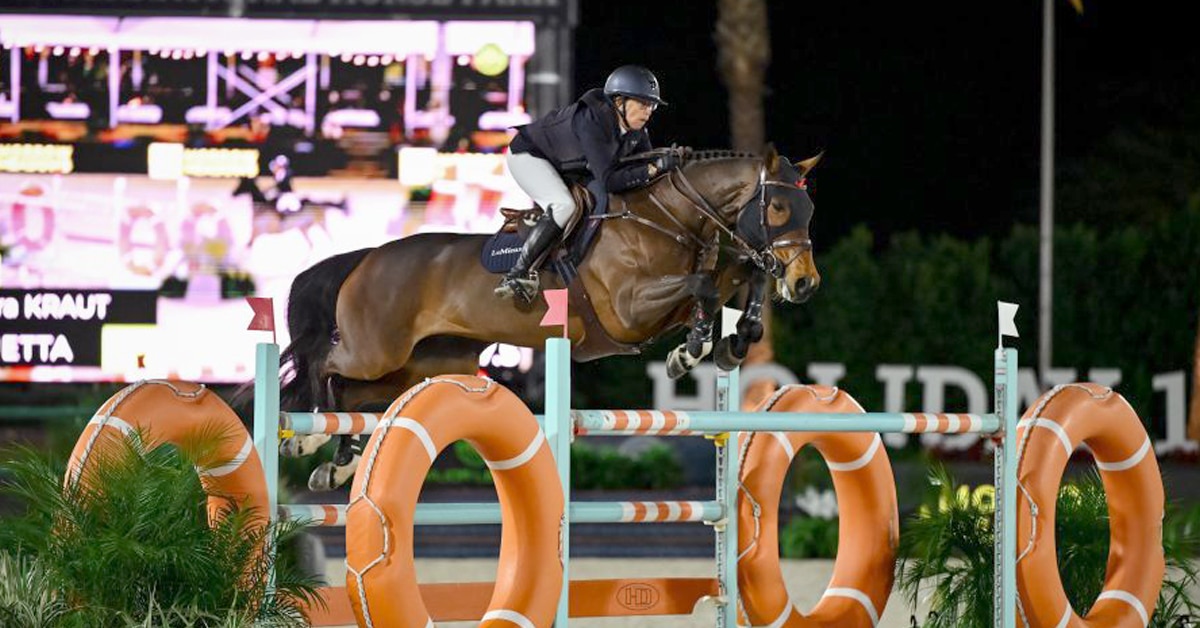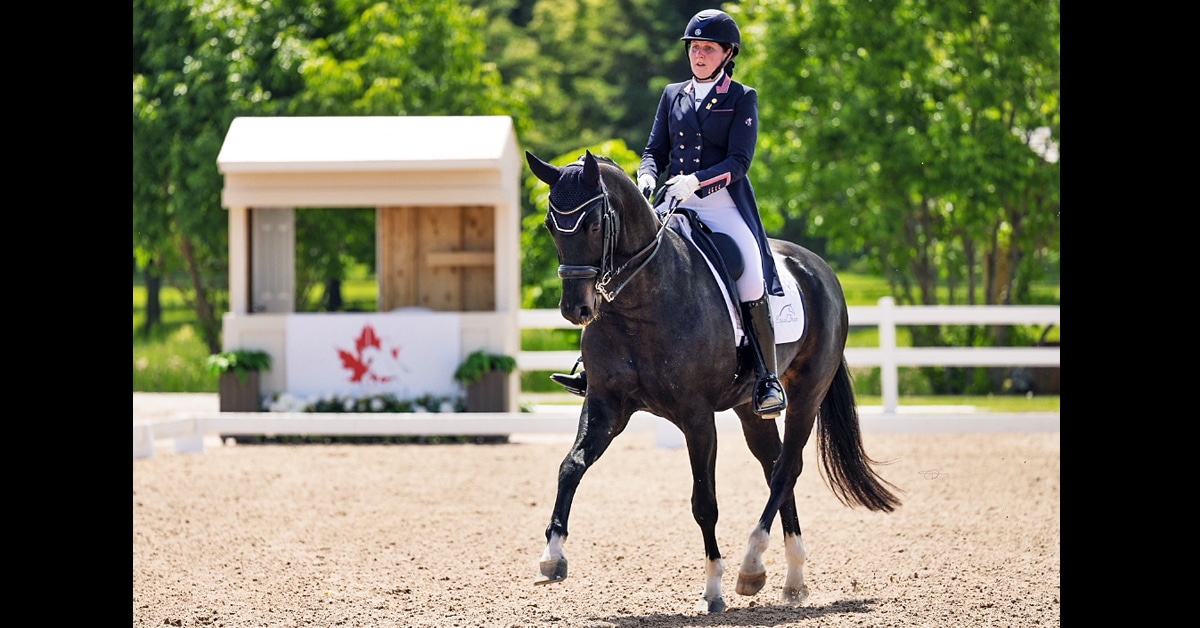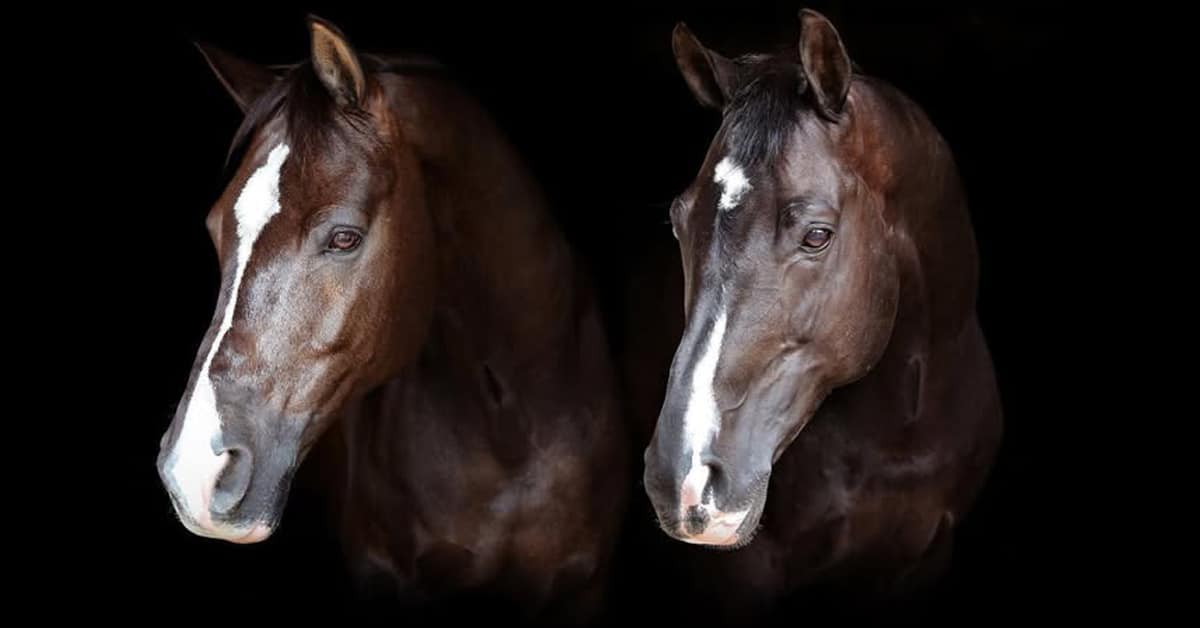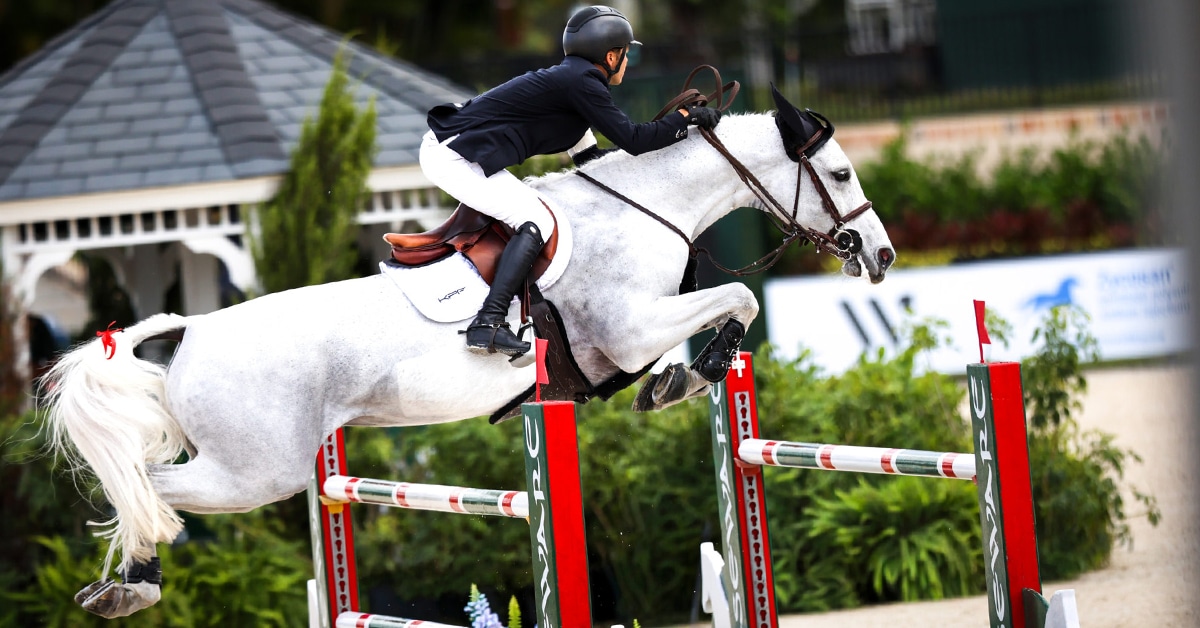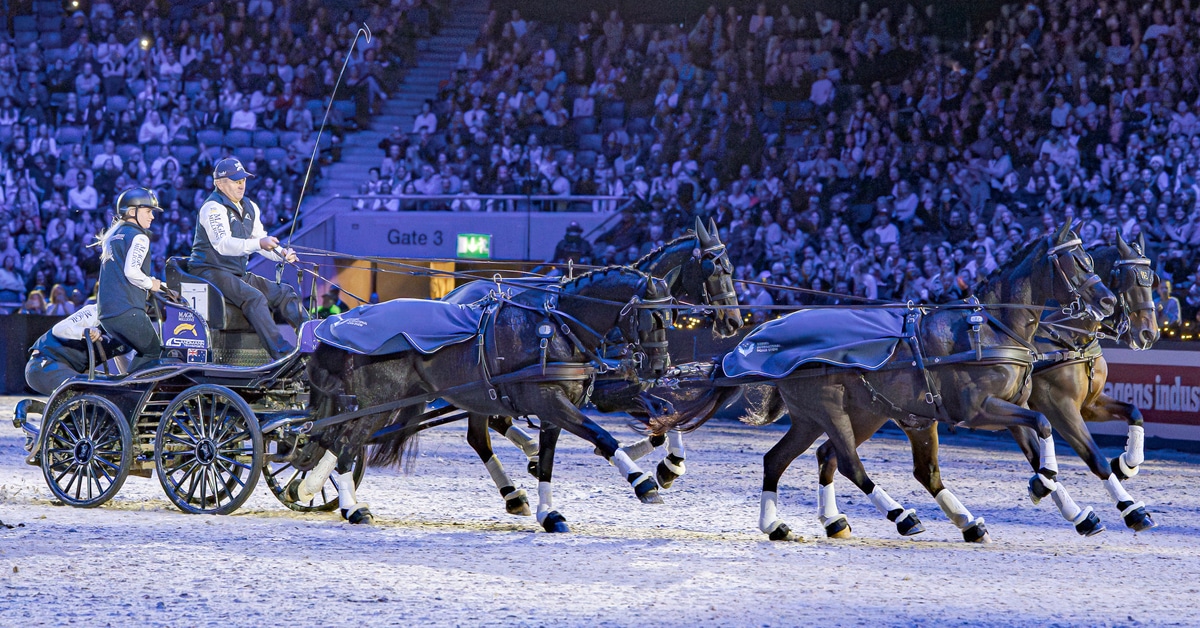Riveting competition, complete with a jump-off to determine the medal positions, saw Christian Kukuk and Checker 47 win the Individual Olympic gold medal, the fourth one for Germany and the first since Ulrich Kirchhoff and Jus de Pomme won in Atlanta in 1996. A rail each for Switzerland’s Steve Guerdat on Dynamix de Belheme and The Netherlands Maikel van der Vleuten on Beauville Z left the two in silver and bronze positions, respectively. Only 25 competitors of the starting 30 completed the course, which produced some major surprises including the elimination of Henrik von Eckermann after he fell from King Edward, and both Rodrigo Pessoa on Major Tom and Daniel Coyle on Legacy retiring.
The day was filled with drama, starting with the early morning news that Great Britain’s Harry Charles withdrew Romeo 88 from competition due to a small overreach injury from the previous day’s competition. This allowed Canada’s Mario Deslauriers and Emerson to be the lone Canadian duo to start. A team veteran, Deslauriers was fully prepared for just this situation and was kindly given the heads-up about the change by team Great Britain.
“When they had a problem, they called me right away to get ready. So that was super sportsmanlike and super nice,” he said of his good friends Peter and Tara Charles, parents of Harry Charles. “I was here to get ready, anyway. I was here at 6:45, rode my horse, and I was totally prepared. I know, in this sport, things like this happen all the time. I’m the first one out, so I might as well be ready. I had my equipment with me, and I was ready to mount and go. And then, on top of it, we all start at zero, so it’s not like I’m so far behind as it was before. I was mentally ready to do this.”
As the first to go, the pair had the unenviable task of finding out how the course of 19 jumping efforts rode.
“Listen, it’s the worst situation you can go in. You’ve got to believe in your plan,” he said. “Sometimes there’s lots of adjustment, but I’m used to it. I ride several horses, and this is, I think, one of my strengths, that I can adjust quickly on course.”
In addition to being large in both height and width, the course was also technically demanding.

(L-r) Silver medalist Steve Guerdat (SUI), gold medalist Christian Kukuk (GER) and bronze medalist Maikel van der Vleuten (NED) after Individual Show Jumping Final at the Chateau de Versailles for the Paris 2024 Olympic Games. (FEI/Benjamin Clark)
“This is probably, for sure, the biggest course I jumped at these Games,” Deslauriers explained in a sentiment echoed by most riders. “This track is very tricky, a lot of bending lines. But you have got to know your horse, they give you options to leave out or to add strides. So it’s all about execution.”
Indeed, it was the execution rather than the size of the course that was the undoing of several pairs including Karl Cook on Caracole de la Roque, who had two rails, and Daniel Coyle on Legacy who retired just before the last jump.
The most stunning moment was when the current World Champion and World Cup winner von Eckermann tumbled from King Edward, although thankfully both were unharmed. Eckermann later explained that it wasn’t that jump in particular, but his ride to the water at the beginning of the related line of three jumps that created the unbalance and miscommunication.
“I tried to the last, but he couldn’t, and then, of course, he turned left and I went right,” explained a distraught von Eckermann.
Of the three clear rounds, the eventual Olympic champion posted the first one of the day.
“Honestly, when I crossed the finish line, that was the most incredible moment, emotional feeling, I’ve ever had in my career. It’s the toughest course I have ever jumped. It’s the toughest course Checker has ever seen and he made it feel like, ’Well, it’s just another Grand Prix, actually’ and I’m just so proud of him,” said Kukuk after the first round.
Not only has Kukuk been training with Ludger Beerbaum since 2012, where he started as an exercise rider, but even his horse is linked to the sport’s retired king. Checker is the son of Comme Il Faut 5, ridden to the team gold medal at the 2011 European Championships by Marcus Ehning, and who is out of Beerbaum’s famed mare Ratina Z who Beerbaum twice rode to team Olympic gold medals.
It is Beerbaum’s guidance that Kukuk credits for much of his success.
“It belongs a lot to Ludger,” he said of his gold medal. “He supports me in difficult moments. He pushed me in the right moment. He knows me well enough now over the years, I know him very well, but the biggest part for him is his experience. He knows every single situation you can have as an athlete. He has had every situation in his life and won the gold medal in ‘92. So his experience is very, very, very important for me and he helped me honestly a lot during the last two weeks.”
“He was pushing me when we left the warm-up, and said you are the favorite and you have it in your hands and you’re able to do it, just do it now,” he said of the words of final words of encouragement Beerbaum gave him. “Honestly, I wasn’t nervous at all going in the jump-off because I knew I had a medal already.”
At his sixth Olympic Games, the 2012 London Olympic individual gold medallist Steve Guerdat won silver today aboard Dynamix de Belheme.
“I live for this kind of moment, for this podium, for these medals. There is nothing bigger than the Olympics. I was really lucky to already (have) the gold, and now the silver with an amazing horse.”
After a difficult start to the Games that saw team Switzerland finish 12th, Guerdat was happy with the final result.
“I’m delighted right now. I can’t even be a little bit disappointed about my jump-off. The happiness and the pride in me is the only thing that matters,” he said, and encouraged Kukuk to truly savour his gold medal moment. “The only regret I have from London is that I still think today that I didn’t enjoy it enough. Because your life change, obviously, after a gold medal. A lot of moments feel like they don’t belong to you anymore. With the years, getting older, you realize that those darn medals are so hard to win, that once you’ve got one you have to enjoy also because there are so many difficult moments in the sport.”

Mario Deslauriers (CAN) and Emerson had the unenviable task of being first in the ring and even with 8 faults fared better than many. (Cara Grimshaw photo)
Making history as the first horse and rider combination to earn two consecutive individual bronze medals, Maikel van der Vleuten and Beauville Z for The Netherlands aimed and just missed for the gold.
“The level is so high these days. If you already have a bronze medal you aim for more, but I took a risk and had an unlucky fence down in the jump-off,” he said. “But still this medal, and being in a big championship for a third time, in the top three as an individual, is unbelievable.”
Van der Vleuten was full of praise for the competition and the course designer.
“I think Santiago Varela and his team did an outstanding job during the whole week. For me, it was definitely the biggest and toughest course I’ve ever done in my career. It’s 15 fences with 19 obstacles on 1.60 and 1.65 and on the highest technical level you can expect, but that’s what the Olympic Games are about. But I think in the end, during the whole week, it was a very fair process for horses, that’s the most important thing. The fact that he got three clear rounds is what you wish for, but you cannot expect that, [and it] shows how incredibly tough this course was, but still what a job from him to get this result.”
Team Canada Take-Away
Chef d’équipe Ian Millar praised all four Canadian riders and reflected on what it will take for Canada to see better results at the 2028 Olympic Games in Los Angeles.
“Jumping tours in Europe are critical,” he commented, echoing the same sentiment shared by the Canadian riders. Course materials and design in Europe are different than in North America and mimic the style seen at the Championship level.
“I think Spruce Meadows gives us a certain amount of readiness,” explained Deslauriers of the large jumps with 12ft wide and heavy poles on Spruce Meadow’s enormous International ring. “When you jump a 1.60 meter oxer and the rails are only 12 foot or 10 foot, it’s a different impression for the horses. I think if we could compete as a team in a few Nations Cups before, it would really benefit a lot of people. I think we need to think about all this for our next game, how to get ready in a better way.”
Teammate Tiffany Foster echoed these sentiments and added that the riders are able to adapt to the change, but need to be exposed to these situations to learn what changes are necessary. She shared what she learned while jumping these types of courses.
“The polls are so light and our horses are so bold,” she explained. “I did Windsor and I did Madrid with a younger horse of mine and I was like, ‘Oh, okay, I need to squeeze less. I’ve got to have less spur. I’ve got to have less pressure.’ The jumps are huge, it’s not that, but they are so delicate… This is a game of millimetres and nanoseconds.”
“It’s not that Canada is doing any worse than we ever did,” concluded Millar. “I think it’s fair to say the rest of the world is getting a little better, and we haven’t, and I would say for financial reasons, mainly, we have had difficulty keeping pace.”
Canada’s perpetual stumbling block is the money to fund such an initiative, estimated to be about $1.5 million more per year to truly give its athletes the exposure they need.
“The idea of CanJump is to do what [Equestrian Canada] is unable to do right now,” he explained of the CanJump initiative which was co-founded by his daughter, Amy Millar, and teammate Tiffany Foster to raise money for Canadian High Performance show jumpers.
“Equestrian Canada is not alone in this situation. Just about every other of the 50-plus federations under Sport Canada are facing severe financial challenges. They’re being asked to do more with less, or at best, the same and often less money. So it’s a very difficult thing, and it’s a very well-known fact that amateur sport, in Canada, is underfunded at this point.”
Results here.
Jumpoff Results here.
More News
